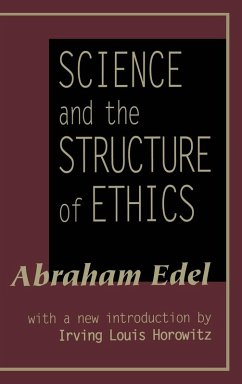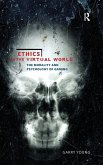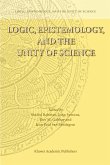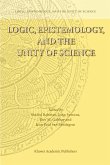Science and the Structure of Ethics
Herausgeber: Edel, Abraham
Science and the Structure of Ethics
Herausgeber: Edel, Abraham
- Gebundenes Buch
- Merkliste
- Auf die Merkliste
- Bewerten Bewerten
- Teilen
- Produkt teilen
- Produkterinnerung
- Produkterinnerung
Initially prepared as part of the Foundations of the Unity of Science volumes under the auspices of the International Encyclopedia of Unified Science, Science and the Structure of Ethics soon took on a life of its own
Andere Kunden interessierten sich auch für
![The Ethics of Science The Ethics of Science]() David B ResnikThe Ethics of Science186,99 €
David B ResnikThe Ethics of Science186,99 €![Ethics in the Virtual World Ethics in the Virtual World]() Garry YoungEthics in the Virtual World188,99 €
Garry YoungEthics in the Virtual World188,99 €![The Ethics of Coaching Sports The Ethics of Coaching Sports]() Robert L SimonThe Ethics of Coaching Sports187,99 €
Robert L SimonThe Ethics of Coaching Sports187,99 €![Logic, Epistemology, and the Unity of Science Logic, Epistemology, and the Unity of Science]() Logic, Epistemology, and the Unity of Science149,99 €
Logic, Epistemology, and the Unity of Science149,99 €![Evolution and Ethics Evolution and Ethics]() Thomas Henry HuxleyEvolution and Ethics17,99 €
Thomas Henry HuxleyEvolution and Ethics17,99 €![Logic, Epistemology, and the Unity of Science Logic, Epistemology, and the Unity of Science]() Shahid Rahman / John Symons / Dov M. Gabbay / Jean Paul van Bendegem (eds.)Logic, Epistemology, and the Unity of Science220,99 €
Shahid Rahman / John Symons / Dov M. Gabbay / Jean Paul van Bendegem (eds.)Logic, Epistemology, and the Unity of Science220,99 €![Evolution and Ethics Evolution and Ethics]() Thomas Henry HuxleyEvolution and Ethics30,99 €
Thomas Henry HuxleyEvolution and Ethics30,99 €-
-
-
Initially prepared as part of the Foundations of the Unity of Science volumes under the auspices of the International Encyclopedia of Unified Science, Science and the Structure of Ethics soon took on a life of its own
Hinweis: Dieser Artikel kann nur an eine deutsche Lieferadresse ausgeliefert werden.
Hinweis: Dieser Artikel kann nur an eine deutsche Lieferadresse ausgeliefert werden.
Produktdetails
- Produktdetails
- Verlag: Taylor & Francis
- Seitenzahl: 118
- Erscheinungstermin: 31. Dezember 1997
- Englisch
- Abmessung: 234mm x 155mm x 15mm
- Gewicht: 431g
- ISBN-13: 9781560003489
- ISBN-10: 1560003480
- Artikelnr.: 26191115
- Herstellerkennzeichnung
- Libri GmbH
- Europaallee 1
- 36244 Bad Hersfeld
- gpsr@libri.de
- Verlag: Taylor & Francis
- Seitenzahl: 118
- Erscheinungstermin: 31. Dezember 1997
- Englisch
- Abmessung: 234mm x 155mm x 15mm
- Gewicht: 431g
- ISBN-13: 9781560003489
- ISBN-10: 1560003480
- Artikelnr.: 26191115
- Herstellerkennzeichnung
- Libri GmbH
- Europaallee 1
- 36244 Bad Hersfeld
- gpsr@libri.de
Abraham Edel (1908-2007), a distinguished American moral and social philosopher, was research professor of philosophy at the University of Pennsylvania and before that the City College of New York. Some of his numerous books are Science and the Structure of Ethics, Aristotle and His Philosophy, and Ethical Judgment.
I. The Nature and Complexity of the Problem 1. Issues in the Relation of
Science and Ethics" 2. The Place of Scientific Results in Ethical Theory 3.
The Role of Scientific Method in Ethical Theory 4. The Impact of the
Scientific Temper in Ethical Theory 5. Moralities 6. Methodological
Approaches in Ethics 7. The Structure of an Ethical Theory II. The Theory
of Existential Perspectives 8. The Concept of an Existential Perspective
(EP) 9. Role of Existential Perspective within an Ethical Theory 10.
Overtly Scientific Existential Perspectives: Physical and Biological 11.
Overtly Scientific Existential Perspectives: Psychological 12. Overtly
Scientific Existential Perspectives: Sociocultural and Sociohistorical 13.
Science in Theological and Metaphysical Existential Perspectives 14.
Science in Transcendence Existential Perspectives 15. Evaluation of
Existential Perspectives III. The Role of Science in Conceptual and
Methodological Analysis 16. Conceptual-Methodological Frameworks 17. Are
There Workable Concepts of Moral Phenomena and Moral Experience? 18.
Ethical Concept-Families and Their Existential Linkage 19. Organization,
Generalization, Systematization 20. Validation, Verification, Reasoning,
Justification 21. Application and Evaluative Processes IV. Decision,
Freedom, and Responsibility 22. Evaluative Processes in Unstructured
Situations 23. Toward a Scientific Study of Freedom and Responsibility 24.
Toward a Strategy for Solution of the Free-Will Problem in Ethics 25. The
Creative Temper and the Scientific Temper
Science and Ethics" 2. The Place of Scientific Results in Ethical Theory 3.
The Role of Scientific Method in Ethical Theory 4. The Impact of the
Scientific Temper in Ethical Theory 5. Moralities 6. Methodological
Approaches in Ethics 7. The Structure of an Ethical Theory II. The Theory
of Existential Perspectives 8. The Concept of an Existential Perspective
(EP) 9. Role of Existential Perspective within an Ethical Theory 10.
Overtly Scientific Existential Perspectives: Physical and Biological 11.
Overtly Scientific Existential Perspectives: Psychological 12. Overtly
Scientific Existential Perspectives: Sociocultural and Sociohistorical 13.
Science in Theological and Metaphysical Existential Perspectives 14.
Science in Transcendence Existential Perspectives 15. Evaluation of
Existential Perspectives III. The Role of Science in Conceptual and
Methodological Analysis 16. Conceptual-Methodological Frameworks 17. Are
There Workable Concepts of Moral Phenomena and Moral Experience? 18.
Ethical Concept-Families and Their Existential Linkage 19. Organization,
Generalization, Systematization 20. Validation, Verification, Reasoning,
Justification 21. Application and Evaluative Processes IV. Decision,
Freedom, and Responsibility 22. Evaluative Processes in Unstructured
Situations 23. Toward a Scientific Study of Freedom and Responsibility 24.
Toward a Strategy for Solution of the Free-Will Problem in Ethics 25. The
Creative Temper and the Scientific Temper
I. The Nature and Complexity of the Problem 1. Issues in the Relation of
Science and Ethics" 2. The Place of Scientific Results in Ethical Theory 3.
The Role of Scientific Method in Ethical Theory 4. The Impact of the
Scientific Temper in Ethical Theory 5. Moralities 6. Methodological
Approaches in Ethics 7. The Structure of an Ethical Theory II. The Theory
of Existential Perspectives 8. The Concept of an Existential Perspective
(EP) 9. Role of Existential Perspective within an Ethical Theory 10.
Overtly Scientific Existential Perspectives: Physical and Biological 11.
Overtly Scientific Existential Perspectives: Psychological 12. Overtly
Scientific Existential Perspectives: Sociocultural and Sociohistorical 13.
Science in Theological and Metaphysical Existential Perspectives 14.
Science in Transcendence Existential Perspectives 15. Evaluation of
Existential Perspectives III. The Role of Science in Conceptual and
Methodological Analysis 16. Conceptual-Methodological Frameworks 17. Are
There Workable Concepts of Moral Phenomena and Moral Experience? 18.
Ethical Concept-Families and Their Existential Linkage 19. Organization,
Generalization, Systematization 20. Validation, Verification, Reasoning,
Justification 21. Application and Evaluative Processes IV. Decision,
Freedom, and Responsibility 22. Evaluative Processes in Unstructured
Situations 23. Toward a Scientific Study of Freedom and Responsibility 24.
Toward a Strategy for Solution of the Free-Will Problem in Ethics 25. The
Creative Temper and the Scientific Temper
Science and Ethics" 2. The Place of Scientific Results in Ethical Theory 3.
The Role of Scientific Method in Ethical Theory 4. The Impact of the
Scientific Temper in Ethical Theory 5. Moralities 6. Methodological
Approaches in Ethics 7. The Structure of an Ethical Theory II. The Theory
of Existential Perspectives 8. The Concept of an Existential Perspective
(EP) 9. Role of Existential Perspective within an Ethical Theory 10.
Overtly Scientific Existential Perspectives: Physical and Biological 11.
Overtly Scientific Existential Perspectives: Psychological 12. Overtly
Scientific Existential Perspectives: Sociocultural and Sociohistorical 13.
Science in Theological and Metaphysical Existential Perspectives 14.
Science in Transcendence Existential Perspectives 15. Evaluation of
Existential Perspectives III. The Role of Science in Conceptual and
Methodological Analysis 16. Conceptual-Methodological Frameworks 17. Are
There Workable Concepts of Moral Phenomena and Moral Experience? 18.
Ethical Concept-Families and Their Existential Linkage 19. Organization,
Generalization, Systematization 20. Validation, Verification, Reasoning,
Justification 21. Application and Evaluative Processes IV. Decision,
Freedom, and Responsibility 22. Evaluative Processes in Unstructured
Situations 23. Toward a Scientific Study of Freedom and Responsibility 24.
Toward a Strategy for Solution of the Free-Will Problem in Ethics 25. The
Creative Temper and the Scientific Temper








